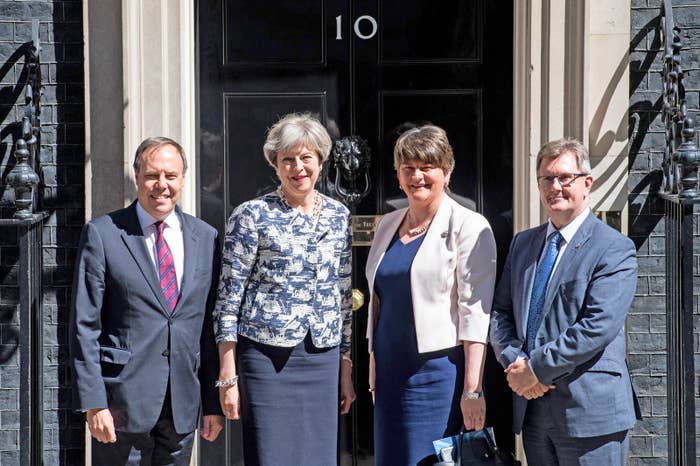
The Democratic Unionist Party and the Conservatives have reached a formal agreement after weeks of uncertainty.
It is a confidence and supply deal and was signed by the chief whips – rather than the party leaders – as the agreement is a parliamentary one.
Speaking outside Number 10 shortly after her chief whip signed the “wide-ranging” deal, DUP leader Arlene Foster confirmed the agreement. She said it would help the minority Conservative party operate a “stable” government in the national interest at a vital time.
Labour leader Jeremy Corbyn condemned the deal, which he said was not in the public interested, but instead a ploy by prime minister Theresa May to "cling to power".
Jeremy Corbyn says "this Tory-DUP deal is clearly not in the national interest but in May's party's interest to help her cling to power"
Following discussion, Foster said, the Conservative party had recognised the case for higher funding in Northern Ireland, “given our unique history and indeed circumstances”.
Northern Ireland will receive £1.5 billion in increased funding, £1 billion of which is entirely new. The other £500 million had been announced before, but Foster said Stormont would be given “new flexibilities" when allocating the funds. A three-page agreement was published online shortly afterwards.
Foster said: “Both parties have agreed that there will be no change to the pensions triple lock and the universal nature of the winter fuel payment across the United Kingdom.
"We are agreed to meet the NATO commitment of spending 2% of GDP on the armed forces, and we are further committed to the Armed Forces Covenant and its implementation throughout the United Kingdom."
Mention of the Armed Forces Covenant, which gives injured military personnel priority for medical treatment, has been a long-running issue in Northern Ireland.
May, politically hamstrung by a disastrous general election result in which she lost her parliamentary majority, needs the DUP's 10 MPs to prop up her minority government.
In a statement, Corbyn added: "The government must immediately answer two questions. Where is the money for the Tory-DUP deal coming from? And, will all parts of the UK receive the much needed additional funding that Northern Ireland will get as part of the deal?
"This Tory-DUP deal is clearly not in the national interest but in May's party's interest to help her cling to power."
Defending the Conservative leader on Sky News, Damian Green, First Secretary of State and Minister for the Cabinet Office, said the deal was an example of May's negotiating skills.
"Theresa May is an extremely good negotiator, this is a deal that is good for Northern Ireland, good for the whole of the UK.
"It provides us with more confidence that the government that people voted for, that got dozens more seats than any other in parliament, will now be able to proceed with its program of legislation, particularly it’s Brexit legislation in a way that will benefit the whole country."
Simon Coveney, Northern Ireland’s minister for foreign affairs and trade, has cautiously welcomed the DUP-Conservative deal, stating that it would further the government’s position on Brexit. He said the agreement was “primarily a matter for these two parties”.
Coveney went on to state: “I note that the agreement provides for DUP support for British government legislation on Brexit”.
Northern Irish politicians have just three days to agree on a power-sharing agreement in Stormont or face direct rule from London.
Power-sharing talks in Northern Ireland between the DUP and Sinn Féin have stalled, with many Northern Irish politicians concerned that a deal between the DUP and the Conservatives would compromise the British government's neutrality in the Northern Ireland peace process.
Foster dismissed these concerns. "I think that this agreement will bring the prospects of doing at deal at Stormont closer because this will have a positive impact in relation to Northern Ireland," she told Sky News before the deal was announced.
Northern Ireland has not had a first and deputy first minister since January, or a power-sharing executive since March. The last agreement, between the DUP and Sinn Féin, collapsed after a green energy scheme went wrong.
This is a breaking news story. Please following @BuzzFeedNews for updates.
